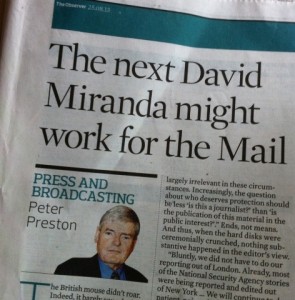This morning’s Observer column.
So the proprietor of the Huffington Post has decided to ban anonymous commenting from the site, starting in mid-September. Speaking to reporters after a conference in Boston, Arianna Huffington said: “Trolls are just getting more and more aggressive and uglier and I just came from London where there are rape and death threats. I feel that freedom of expression is given to people who stand up for what they say and [are] not hiding behind anonymity. We need to evolve a platform to meet the needs of the grown-up internet.”
Quite so. I can see heads nodding in agreement. After all, much anonymous online commenting seems to be stupid, nasty, vicious and ignorant. And that’s just the stuff that isn’t tangential to the topic of the article being commented on. If people have to take responsibility for what they say in public, then they will surely behave better.
That seems like common sense. Whether it is supported by evidence is, however, uncertain because at the moment there isn’t much research, and what there is seems to be mostly anecdotal…
There are, it seems to me, two kinds of problems with online commenting in its current form. The first is bad or pathological behaviour — trolling etc. As I say in the column, there are ways of dealing with that. And there’s always Anil Dash’s method — see his terrific post “If your website’s full of assholes, it’s your fault”. The second problem is that of harnessing the possibilities of online discussion as a way of enlarging and enhancing the public sphere. Many comments are thoughtful, informed and pertinent, and yet are submerged in morasses of incivility and webs of incomprehensible infighting. Which leads to the thought that perhaps the problem is architectural. Maybe web sites are providing the wrong sort of virtual space. After all, as someone once said, if you provide a boxing ring, people will fight.
Mat Honan has an interesting thought about this. For too long, he says, comments have been stuck in overlooked back alleys where anyone can leave digital graffiti on online real estate.
We’ve bought into the fallacy of comments so completely that they remain nearly universal—and universally terrible. A lot of people have tried to fix them. Yet, as Digg CEO Andrew McLaughlin says, “everyone who runs a commenting system ends up killing themselves or shooting up a post office.” It’s hyperbole, sure, but trying to wrangle online conversations is a messy, frustrating, and typically thankless affair that involves more time than most people have. Even a dedicated team of moderators can hardly compete with legions of trolls and spambots. Nonetheless, lots of people are trying to make you read the comments again—because in those rare moments when comments are great, they are some of the best parts of the Internet.
The most talked-about new system is probably Branch, which moves discussions over to its site and lets publishers select the best threads to embed on their own pages. Want to weigh in? You’ll need to be invited by a discussion’s host or one of its participants. That barrier to entry cuts down on toxic drive-by commenting. When people have to be invited, they’re less likely to be jackasses.
Meanwhile, Gawker built an entirely new publishing platform based on commenting. Called Kinja, it lets authors and readers isolate thought-provoking discussions so every comment isn’t just vomited up chronologically. But Kinja isn’t only about bringing civility; it’s also about moving the story forward by treating an article as a starting point rather than a product. This doesn’t happen magically—it takes work. Writers must actually dive into discussions to surface interesting conversations.
Both of these systems treat discussions as independent acts instead of afterthoughts. “If you want quality conversation, you have to elevate it,” says Josh Miller, who cofounded Branch.
PS: After writing this I came on a lovely cartoon in the New Yorker. It shows Moses reading out the Tablets to the assembled Israelites. At the back, a chap has put up his hand. “Does it have a section at the bottom for comments?” he asks.




